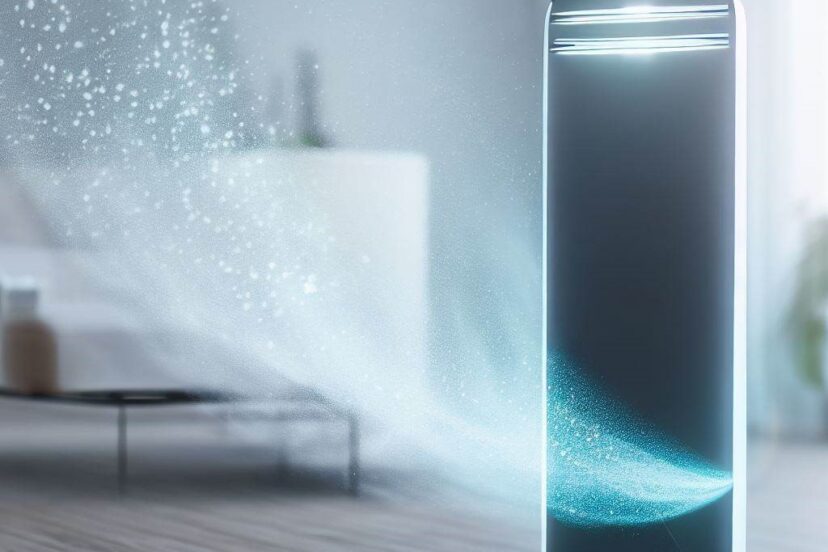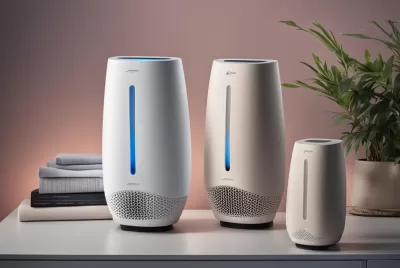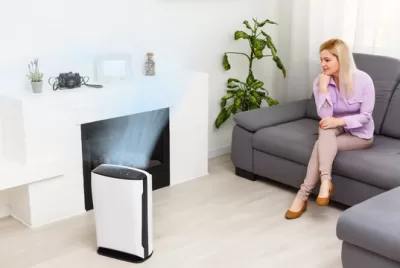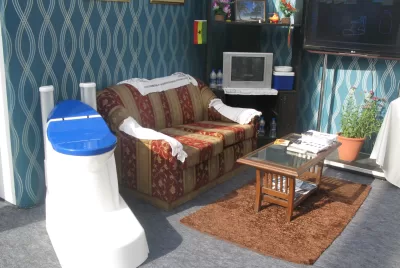Purpose of Air Purifier: An Essential Guide No.2
"We may earn a commission for purchases made using our links. Please see our disclosure to learn more."
The Invisible Menace: Indoor Air Pollutants
Imagine your home. It’s a fortress, a haven, a place of solace where you’re in charge of every element, from the decor to the room temperature.
But wait, can you control the quality of air you breathe within this fortress? It’s a bit unnerving to think that invisible foes like dust, pet dander, smoke, volatile organic compounds (VOCs), and allergens could be quietly residing in the air of our homes.
Recognizing these unseen invaders is our first step in understanding the air purifier purpose.
The Magic of Air Purifiers: Serving Their Purpose
Air purifiers, with their seemingly simple exteriors, are like magicians performing a constant act of purification. But what’s the trick behind this magic show?
How do these devices fulfil their purpose? Through a multitude of techniques – be it high-quality filters, ultraviolet light, or advanced electrostatic precipitators – air purifiers strive to rid our indoor air of harmful particles and contaminants.
Just like specific magicians are known for their signature tricks, some air purifiers specialize in certain areas.
For example, certain models are excellent at trapping allergens, while others excel at removing smoke or reducing VOCs.
Knowing your indoor air quality needs will help determine which air purifier is the perfect match for you.
So, as we dive deeper into the world of air purifiers, our understanding of their purpose becomes clearer. They are here to fight our unseen battles against indoor pollutants, each in its unique way. As we further explore, we will learn how they contribute to our well-being and health in more ways than one.
Ready for the deep dive?
Types of Air Purifiers and Their Purpose
Just like we have different tools to tackle different tasks, air purifiers too come in various types, each with a specific purpose. It’s not a one-size-fits-all solution. From dust to pollen, smoke to odors, different air purifiers are geared to combat different pollutants. Let’s demystify these varieties:
HEPA Air Purifiers: The Purpose They Serve
Enter HEPA air purifiers, the rockstars of the air purification world. They’re like the diligent librarians of the air purifier realm, meticulously filtering out up to 99.97% of particles as small as 0.3 microns. This includes those tiny intruders like dust, smoke, and pollen that your eyes can’t see but your body can definitely react to.
They work like a sieve, trapping these particles and giving you air that’s noticeably cleaner. For those of us who experience allergies or are sensitive to dust and pollen, HEPA air purifiers serve as a veritable shield. Just imagine your space with significantly fewer allergens – sounds like a breath of fresh air, doesn’t it?
Activated Carbon Air Purifiers: A Specific Purpose
Now, let’s meet the activated carbon air purifiers. Think of them as the sniffer dogs of the air purifier world. Their distinct purpose lies in detecting and eliminating those elusive odors, gases, and volatile organic compounds (VOCs) that HEPA filters might miss.
They operate like a sponge, soaking up these gases and odors, and are particularly effective for those sensitive to smells or with chemical sensitivities. So if you’re looking for an air purifier that will banish that stubborn smell of burnt toast or the lingering scent of cleaning agents, an activated carbon air purifier is your go-to. (Here is another logical place to refer to a specific activated carbon air purifier model.)
Remember, understanding the purpose of these different types of air purifiers allows you to make an informed choice based on your unique needs. The right air purifier is the one that addresses your specific indoor air quality issues.
H3: Benefits of Air Purifiers: Realizing Their Purpose
As we journey deeper into the realm of air purifiers, we find that the air purifier purpose extends beyond just cleaning the air. They have a knack for creating a positive ripple effect, touching various aspects of our health and overall well-being. Let’s shed some light on these benefits:
Health Benefits: The Core Purpose of Air Purifiers
The heart of the purpose of air purifier pulsates with the promise of improved health. It’s as if these devices are personal healthcare professionals, silently working round the clock to shield us from health threats in our air.
- Allergy Alleviation: Do you find yourself sneezing or with watery eyes every time dust or pollen season comes around? Air purifiers, especially those with HEPA filters, are ace at trapping these allergens, potentially reducing your allergy symptoms. It’s like having a personal bodyguard that keeps these irritating particles at bay (Consider mentioning a specific HEPA air purifier here that excels in filtering allergens).
- Asthma Attack Reduction: For those with asthma, certain triggers in the air can cause an attack. These triggers could be anything from dust mites to smoke or mold spores. The purpose of air purifiers here is to reduce the presence of these triggers, aiding in minimizing the risk of asthma attacks.
- Airborne Disease Minimization: We’ve all become hyper-aware of airborne diseases. An air purifier won’t make your home an impenetrable fortress against viruses, but certain models can significantly reduce airborne particles, including some bacteria and viruses. It’s an extra layer of defense, a gatekeeper if you will
- Better Sleep: Imagine sleeping in an environment with cleaner air. Studies suggest that improved air quality may promote better sleep. So, air purifiers might just be your ticket to dreamland, offering you a chance at more restful nights.
Indeed, the purpose of an air purifier has a profound connection with our health. But the benefits don’t stop here. As we peel back more layers, we discover that air purifiers can improve not just our health, but our overall quality of life.
The Worth of an Air Purifier: Is It a Worthy Investment?
After exploring the purpose of air purifiers and the different types available, it’s natural to wonder about the value proposition. After all, is an air purifier a worthy investment? Let’s put it under the microscope.
Health is Wealth: The Case for Air Purifiers
At first glance, air purifiers might seem like just another appliance added to your home. But when you consider the multitude of benefits they bring to the table, they suddenly transform from a ‘nice-to-have’ to a ‘must-have’.
Air purifiers, in essence, are the champions of your health. They tirelessly work to ensure that the air you breathe is clean and free of harmful pollutants. With the rise of various airborne diseases and allergies, this aspect of air purification is not to be taken lightly.
A robust air purifier can make a world of difference for those with allergies or respiratory conditions. The relief it offers, the reduction of risks, and the resultant peace of mind – these are things that you can’t put a price tag on.
Investing in a Better Quality of Life
Moreover, an air purifier is an investment in better quality of life.
Imagine a home where odors are quickly neutralized, allergens are minimized, and your sleep quality improves because the air you breathe is cleaner and healthier.
These subtle changes can profoundly impact your day-to-day life, making your home a sanctuary where you can truly relax.
Yes, the upfront cost of an air purifier can be significant, but when viewed as an investment in health and wellness, it makes perfect sense. It’s a matter of prioritizing long-term health benefits over short-term expenditure.
Choosing the Right Air Purifier: Fulfilling Your Specific Purpose
Once you have recognized the value of an air purifier and decided to invest in one, the next hurdle is choosing the right one. But worry not. The key to this choice lies in understanding your specific needs and how different types of air purifiers can cater to them.
Understanding Your Needs: What’s The Purpose of Air Purifier?
The first step in choosing the right air purifier is understanding your specific needs. Do you need an air purifier to help with allergies? Or perhaps you’re more concerned about odors or chemical sensitivities? Identifying your needs will help you select an air purifier that serves your specific purpose.
- Allergies: If allergies are your main concern, an air purifier with a HEPA filter, like Air Purifier X, would be your best bet. These filters excel in removing allergens from the air.
- Odors and Chemical Sensitivities: If you’re sensitive to odors or chemicals, you’d do well with an air purifier that includes an activated carbon filter, such as Air Purifier Y. These filters are great for neutralizing odors and removing VOCs.
Evaluating Air Purifier Features
Besides catering to your needs, you should also consider the features offered by different air purifiers. Some air purifiers may have smart features like air quality indicators, programmable timers, or Wi-Fi capabilities. Others might boast eco-friendly features like energy efficiency or recyclable filters.
In the end, it’s all about choosing an air purifier that best serves your needs and fits into your lifestyle. An air purifier can only fulfill its purpose if it’s the right fit for its user.
Proper Maintenance: Maximizing Your Air Purifier’s Purpose
Now that you’re an informed potential air purifier owner, there’s one more critical aspect to discuss – maintenance. The purpose of an air purifier can only be fully realized with proper upkeep.
Regular Filter Changes: Keeping the Purifier at Peak Performance
Filters are the heart and soul of an air purifier. Depending on the type, air purifier filters need to be replaced regularly to maintain their effectiveness.
Neglecting this step can lead to reduced air purification and could even harm the device in the long run.
For example, some filters need to be replaced every 6-12 months. This might seem like a chore, but it’s a small price to pay for the consistent clean air you’ll enjoy.
General Cleaning: Prolonging the Life of Your Air Purifier
Along with replacing filters, it’s a good idea to clean the exterior of your air purifier regularly. Dust can accumulate on the intake and outflow vents, which can affect the device’s efficiency. A simple wipe-down with a clean cloth can often do the trick.
Conclusion: Embracing the Air Purifier Purpose
At the end of the day, understanding the air purifier purpose is key to making the most of these devices. They’re more than just appliances—they’re tools that can significantly improve your indoor air quality and, by extension, your health and quality of life.
It’s clear that investing in an air purifier is not just a purchase; it’s a commitment to healthier living.
H2 FAQ
1. Can air purifiers help with allergies?
Yes, air purifiers, especially those with HEPA filters, can help reduce allergens in the air, potentially alleviating allergy symptoms.
2. Can an air purifier eliminate odors?
Yes, air purifiers with activated carbon filters are effective in neutralizing various odors.
3. How often should I change my air purifier’s filter?
This largely depends on the air purifier model and filter type, but generally, filters should be replaced every 6-12 months.
4: Can air purifiers help improve sleep?
Yes, by improving the quality of the air you breathe, air purifiers may contribute to better sleep.
5: Are air purifiers noisy?
The noise level of an air purifier depends on the model and the speed setting. Most air purifiers are relatively quiet, especially on lower settings.
6: Can I leave my air purifier on all the time?
Yes, most air purifiers are designed to run continuously. In fact, leaving your air purifier on all the time ensures that your air is constantly being cleaned.
7: Do all air purifiers use a lot of electricity?
The amount of electricity an air purifier uses varies based on the model and its settings. Some models feature energy-saving modes to help minimize electricity usage.
8: Are air purifiers effective against viruses and bacteria?
While air purifiers can’t guarantee 100% removal of viruses and bacteria, certain models with HEPA filters or UV-C light can significantly reduce these particles.
9: Can air purifiers help with pet dander?
A9: Absolutely! Air purifiers can help capture pet dander from the air, making them a good choice for pet owners.
10: Are air purifiers safe to use?
A10: Yes, when used properly, air purifiers are safe. However, certain types, like ozone generators, can be harmful and should be used with caution.




